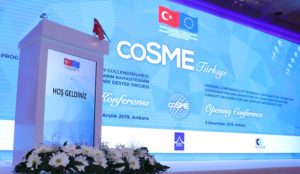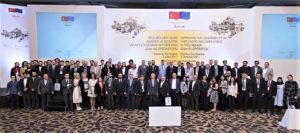
Technical Assistance for Implementation of Civil Society Dialogue and Civil Society Support Programmes (TR2015/DG/01/A5-01/001)
The overall aim of the project is to increase bilateral exchanges and cooperation between CSOs in Turkey and the EU at local, regional and national levels, to promote awareness raising initiatives on importance and benefits of membership of Turkey to the EU within Turkey and EU and on

Technical Assistance for Garment Training and Entrepreneurship Initiative (GATE for Women)
Women’s inequality in the labour sector has been an unsolved problem for generations. However, if women find the right support at the right time, it provides excellent results. Likewise, the overall aim of this project was to increase women’s employability and support women’s entrepreneurship by strengthening women’s vocational

Technical Assistance for Enhancing Coordination and Promotion of the COSME Programme and Capacity Building for SME Support Infrastructure
The main objective of this contract is increasing the intermediary organisations and SMEs’ knowledge on COSME (Competitiveness of Enterprises and Small and Medium-sized Enterprises) and to enhance the coordination capacity in the country for effective participation in the programme and the Small Business Act (SBA) framework.

Technical Assistance for the Operation of “Hand Made in Hatay”
However, Antakya craftspeople and businesses can offer original designs and fine workmanship and can draw on a long master-apprentice tradition and rich multicultural history, the city has not lived up to its potential. This initiative, the Hand Made in Hatay project is part of a larger initiative, financed

EU Eastern Anatolia Development Programme (EADP)
The East of Turkey has had delayed progress compared to the economic development of other regions in Turkey. In this context, the Eastern Anatolia Development Programme was a regional development programme aimed at building capacity for sustainable development by implementing innovative and participatory local policy and planning approaches.

Technical Assistance for Improving the Adaptability of Employers and Employees in TR33
Qualified individuals mean a powerful region and a powerful region requires investing in human resources. Hence, this assignment aimed to encourage employers and employees of SMEs in the TR33 Region (Kütahya, Afyonkarahisar, Manisa, and Uşak provinces), particularly by promoting lifelong learning. More specifically, the project’s purpose was to

